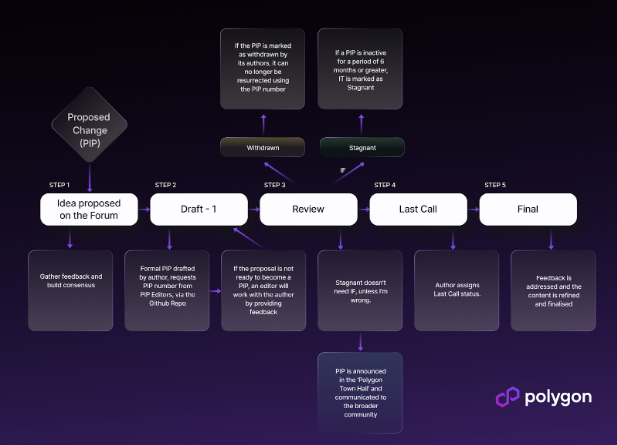I’ve compiled a list of the most crucial questions related to Polygon Improvement Proposals. In case you don’t find the answer to your query here, please refer to the resources mentioned at the end of this post! ![]()
What are PIPs?
Polygon Improvement Proposals (PIPs) describe standards for the Polygon ecosystem and govern the process through which the Polygon community introduces, finds consensus on, and implements changes to Polygon protocols. A PIP provides information to the Polygon community about suggested changes to the Polygon protocols. Authors use PIPs to document proposed changes, understand community sentiment, incorporate feedback, and provide technical specifications behind the suggested changes.
The PIP process
The Polygon Improvement Proposal (PIP) process is a preliminary approach for allowing the community to put forward-protocol upgrades that aim at improving Polygon PoS. This process is inspired by the PEP process, which has been used in the development of frameworks for other open-source projects, including Ethereum and Bitcoin. As a guiding rule, it is recommended that all changes originate from the Polygon Community Forum and the PIP GitHub repository in the form of a proposal written in line with PIP-1. It is suggested to consult with the Governance processes board regarding implementing different types of PIPs, as separate classifications of PIPs have other implementation flows.
Who can propose a PIP?
Anyone can propose a PIP.
Why submit a PIP?
- To introduce changes to the Polygon protocols.
- To offer new standards to the ecosystem.
- To encourage open and transparent discussion and decision-making about changes to the Polygon protocols, ensuring that any changes are well thought-out and aligned with the goals of the Polygon community.
Where are the PIPs hosted?
The PIPs are available on GitHub.
What does the PIP process look like?
Take a look at the flowchart that explains how the PIP process works:
What is the difference between a PIP and a PRC, and how to decide which one I am submitting?
There is little of a difference.
Polygon Improvement Proposal (PIP) and Polygon Request for Comments (PRC) are similar in that they both serve as a standard for proposing Polygon protocol improvements and additions. However, the scope of the proposals they represent differs slightly.
PIPs have a broader scope and can include proposals for Polygon protocol improvements such as protocol changes, blockchain upgrades, and new features.
Conversely, PRC is primarily concerned with proposals for standardizing smart contracts based on the Polygon protocols. PRCs define smart contract development and deployment standards, such as token standards, and serve as a foundation for developers to build on.
In summary, PIPs are for proposals that aim to improve the Polygon protocols as a whole, while PRCs are for proposals that aim to standardize smart contract development on Polygon protocols.
If you are still determining which category your proposal falls under, don’t worry; PIP Editors can help you with that.
Who are the PIP Editors, and what do they do?
A PIP editor’s role is to facilitate the PIP process, and they DON’T hold the authority to decide if the PIP is finally approved (whether by on-chain consensus or ecosystem adoption).
PIP Editors ensure that:
- PIP is well formatted and technically complete.
- The PIP repository is maintained, and the standards for PIPs are met.
How to become a PIP Editor, and what does the selection process look like?
Everyone can apply to become a PIP editor, given they match the following requirements.
- Understands Polygon protocols at an expert level.
- Is familiar with the PIP and similar frameworks used on other decentralized blockchains.
- Is proficient in using GitHub.
- Is a good communicator.
- Can appropriately handle contentious discourse.
If you believe you are a good candidate for becoming a PIP editor please fill out this form.
